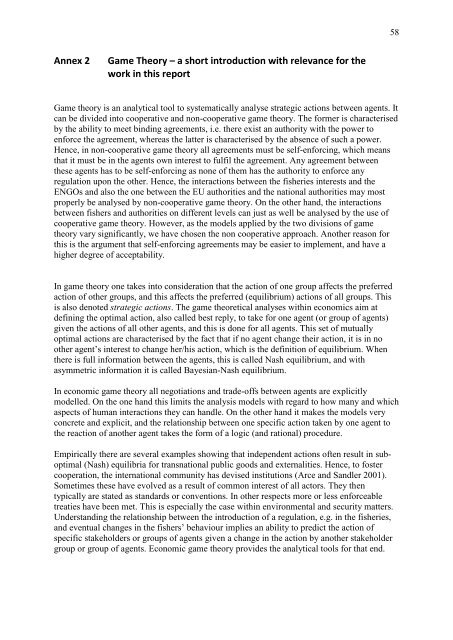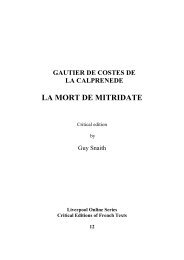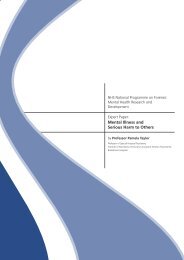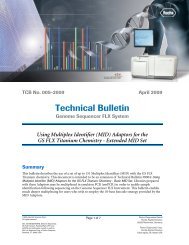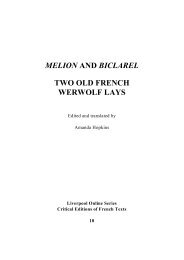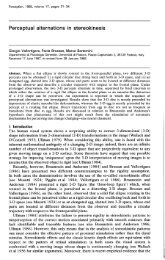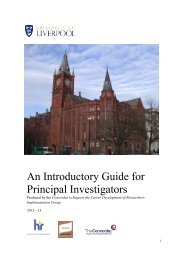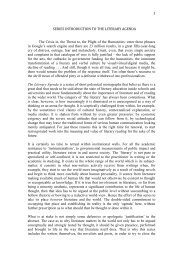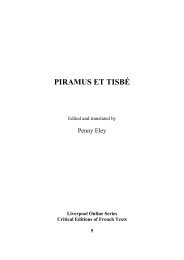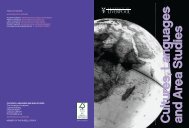Operational tools and adaptive management
Operational tools and adaptive management
Operational tools and adaptive management
You also want an ePaper? Increase the reach of your titles
YUMPU automatically turns print PDFs into web optimized ePapers that Google loves.
Annex 2 Game Theory – a short introduction with relevance for the<br />
work in this report<br />
Game theory is an analytical tool to systematically analyse strategic actions between agents. It<br />
can be divided into cooperative <strong>and</strong> non-cooperative game theory. The former is characterised<br />
by the ability to meet binding agreements, i.e. there exist an authority with the power to<br />
enforce the agreement, whereas the latter is characterised by the absence of such a power.<br />
Hence, in non-cooperative game theory all agreements must be self-enforcing, which means<br />
that it must be in the agents own interest to fulfil the agreement. Any agreement between<br />
these agents has to be self-enforcing as none of them has the authority to enforce any<br />
regulation upon the other. Hence, the interactions between the fisheries interests <strong>and</strong> the<br />
ENGOs <strong>and</strong> also the one between the EU authorities <strong>and</strong> the national authorities may most<br />
properly be analysed by non-cooperative game theory. On the other h<strong>and</strong>, the interactions<br />
between fishers <strong>and</strong> authorities on different levels can just as well be analysed by the use of<br />
cooperative game theory. However, as the models applied by the two divisions of game<br />
theory vary significantly, we have chosen the non cooperative approach. Another reason for<br />
this is the argument that self-enforcing agreements may be easier to implement, <strong>and</strong> have a<br />
higher degree of acceptability.<br />
In game theory one takes into consideration that the action of one group affects the preferred<br />
action of other groups, <strong>and</strong> this affects the preferred (equilibrium) actions of all groups. This<br />
is also denoted strategic actions. The game theoretical analyses within economics aim at<br />
defining the optimal action, also called best reply, to take for one agent (or group of agents)<br />
given the actions of all other agents, <strong>and</strong> this is done for all agents. This set of mutually<br />
optimal actions are characterised by the fact that if no agent change their action, it is in no<br />
other agent‟s interest to change her/his action, which is the definition of equilibrium. When<br />
there is full information between the agents, this is called Nash equilibrium, <strong>and</strong> with<br />
asymmetric information it is called Bayesian-Nash equilibrium.<br />
In economic game theory all negotiations <strong>and</strong> trade-offs between agents are explicitly<br />
modelled. On the one h<strong>and</strong> this limits the analysis models with regard to how many <strong>and</strong> which<br />
aspects of human interactions they can h<strong>and</strong>le. On the other h<strong>and</strong> it makes the models very<br />
concrete <strong>and</strong> explicit, <strong>and</strong> the relationship between one specific action taken by one agent to<br />
the reaction of another agent takes the form of a logic (<strong>and</strong> rational) procedure.<br />
Empirically there are several examples showing that independent actions often result in suboptimal<br />
(Nash) equilibria for transnational public goods <strong>and</strong> externalities. Hence, to foster<br />
cooperation, the international community has devised institutions (Arce <strong>and</strong> S<strong>and</strong>ler 2001).<br />
Sometimes these have evolved as a result of common interest of all actors. They then<br />
typically are stated as st<strong>and</strong>ards or conventions. In other respects more or less enforceable<br />
treaties have been met. This is especially the case within environmental <strong>and</strong> security matters.<br />
Underst<strong>and</strong>ing the relationship between the introduction of a regulation, e.g. in the fisheries,<br />
<strong>and</strong> eventual changes in the fishers‟ behaviour implies an ability to predict the action of<br />
specific stakeholders or groups of agents given a change in the action by another stakeholder<br />
group or group of agents. Economic game theory provides the analytical <strong>tools</strong> for that end.<br />
58


